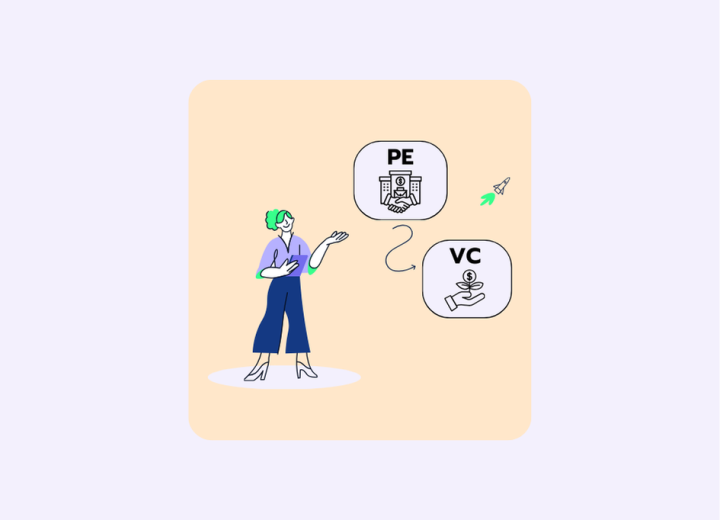How Is the Interview Process in PE?
If you secure an interview in a PE firm, expect a multi-stage process. The common stages include an initial phone interview, first-round interviews, technical assessments, and final interview rounds.
The specific stages of the interview process in PE may vary depending on the firm's size, investment strategy, and culture. However, if you prepare for this general process, you’ll be good to go.
1. Phone Interview Stage
After candidates submit their resumes, recruiters shortlist qualified candidates who get into the initial phone screening stage. You can get a phone interview with a recruiter or HR representative from the company.
They mostly ask fit questions that tell them about your motivation for wanting to work in PE, why you chose their firm, and your understanding of the industry. There will also be questions about your background and qualifications.
2. First Round Interviews
If you pass the initial screening, you’ll move to the first-round of interviews which is more in-depth. In most cases, you’ll meet multiple interviewers who ask both behavioral and technical questions.
So, expect to discuss your previous experiences in detail, answer technical questions related to finance and valuation, and possibly engage in case studies or modeling tests. Common fit or behavioral questions in this stage include
- Why private equity?
- Can you walk me through your resume?
- Which deals or transactions have you worked on?
- Tell me about a time when you worked under pressure
Here are some common technical PE questions during this interview stage:
- How do you build an LBO model step-by-step?
- How do PE firms exit an investment?
- Is it necessary to look at both the internal rate of return (IRR) and cash-on-cash return when checking returns? Why?
- If a PE firm has managed to double it’s initial investment in four years, what’s the IRR?
3. Technical Assessments
Once you ace the first-round of interviews in PE, your next step will most likely be heavily technical. Questions might include explaining how a company's capital structure affects its valuation or walking through a leveraged buyout (LBO) scenario.
This stage may also involve case studies and modeling tests. The modelling tests assess your ability to build financial models and analyze investment opportunities while the case studies reveal your ability to think like an investor.
Depending on the firm, the financial modelling tests and case studies might be separated into different interviews.
4. Final Rounds
The interviewers in the final round are often the senior professionals, partners or managing directors, at the firm. They test long-term cultural fit, leadership potential, and strategic thinking. So, prepare to talk about your investment philosophy and how it aligns with the firm's strategy. You’ll also provide specific examples of your previous deal experience and your role in those transactions.
This is the stage where the firm determines if you are the right person for the job. If you are, they will consider your performance in the previous interview stages and send a job offer within a week or two.
Which Skills Are Tested During an Interview in Private Equity?
PE firms test for technical and soft skills during the interviews. The soft skills include negotiation, teamwork, communication, relationship-building, and problem solving. Here’s an overview of the specific skills they test under the technical category:
- Financial Modeling: Tests your proficiency in building financial models, particularly leveraged buyout (LBO) models.
- Valuation: Evaluates your familiarity with various valuation methods, such as discounted cash flow (DCF) analysis, multiples, and understanding how to assess a company's financial health.
- Financial Analysis: Shows your ability to analyze financial statements, understand key financial ratios, and assess a company's capital structure.
- Debt Financing: Tests your knowledge of how private equity funds structure their investments, including debt financing and equity allocation.
- Transaction Analysis: Assesses your ability to analyze deals, understand deal structures, and identify potential issues or opportunities.
Interview Questions that Test Technical Skills
Here are some of the most common PE interview questions that test your technical skills.
What’s the step-by-step process of building an LBO model from scratch?
This question tests whether you understand what an LBO is and how the process works. An LBO or Leveraged Buyout is when a private equity firm uses a significant amount of borrowed money or debt to finance the acquisition of a company. The remaining portion of the purchase price is funded with the PE firm's own capital or equity. Hopefully, the acquired company's cash flows can service and eventually repay the debt and the PE firm can exit the investment with a strong return.
But it isn’t always practical or sensible to use an LBO, so PE firms build LBO models to figure out if a potential acquisition makes financial sense. An LBO model is a financial model built in software like Excel to simulate this entire process. It projects the company's financial performance under the new leveraged structure, analyzes the returns for the PE firm under various scenarios, and helps determine if the acquisition is attractive.
Your answer to the question could go something like this:
"I typically build an LBO model in five steps:
- First, I set up the transaction assumptions – including the purchase price, financing structure (equity vs. debt), and key operational assumptions such as revenue growth and margin development.
- Next, I model the integrated income statement, balance sheet, and cash flow statement over the investment period to reflect the company’s performance.
- In the third step, I model the debt tranches, including interest payments, principal repayments, and potential covenant tests.
- Then I define the exit – usually based on an exit multiple applied to EBITDA or EBIT – and calculate the returns to investors.
- Finally, I calculate key metrics such as IRR and multiple on money, and run sensitivity analyses to test the robustness of the investment thesis.
The key is to build the model in a clean, flexible, and sensitivity-friendly way."
What makes a company suitable for a leveraged buyout (LBO) transaction?
The ideal LBO candidate should have predictable, stable cash flows to reliably service debt obligations. Such a firm operates in a non-cyclical industry since volatile earnings can threaten debt obligations during downturns.
It’s also important that the business is mature with limited capital expenditure needs to allow cash to flow toward debt repayment rather than reinvestment.
Another important factor is operational improvement potential. If a business has such opportunities whether it’s through cost-cutting, pricing optimization, or consolidation opportunities, bringing in a strong management team who can execute the improvements can add massive value.
Companies with defendable market positions, either through scale advantages or intellectual property, are also a good target since they protect the consistent cash generation needed.
Lastly, the company shouldn’t be too expensive to buy initially and should have room for bolt-on opportunities. That is, opportunities to buy smaller, related businesses later which can lead to higher returns during the investment period and exit time.
How would you explain to a client why their business might be valued differently than a competitor with nearly identical financial performance?
You should explain to the client that while financial statements show historical performance, valuation reflects investors' expectations of future returns. Several factors beyond financials affect valuation differences.
A stronger market position, resulting from advantages like unique technology or brand loyalty, can lead to a higher valuation due to the perceived sustainability of profits. Similarly, superior growth prospects in a larger market will command a premium.
The quality of your revenue and the strength of your management team also matter. Predictable, recurring revenue streams are generally valued more highly than volatile sales. A proven management team creates greater investor confidence. Also, a healthier balance sheet with lower debt reduces perceived risk, which can positively impact valuation even with comparable profitability.
So, I’d aim to clearly explain that valuation captures the market's confidence in future cash flows, not just current financial performance.
How to Prepare for the PE Interview
If you want to ace PE interviews and get hired, prepare thoroughly through proven steps like self-study, mock interviews, and interview coaching. Here’s how each of these interview preparation tips makes your dream career more attainable.
1. Self-Study.
Take some time to study alone and master what’s required to succeed in PE. During this time, focus on building a strong foundation in financial modeling, LBO analysis, and investment case studies. You can start by mastering core concepts like DCF analysis, enterprise valuation, and leveraged buyout mechanics.
Feel free to download practice models from financial training websites and rebuild them from scratch to understand the logic behind each calculation. To stay updated on deals and market trends, find and read industry publications. You can also create investment theses for companies you find interesting, and practice how you'd evaluate them as potential PE targets. The goal is to develop both technical skills and investment judgment that you can demonstrate during your interview.
👉 Check out our Case Library to explore examples for cases and technical questions in PE interviews.
2. Practice with Mock Interviews.
After building your knowledge base, mock interviews give crucial feedback on your delivery and thinking process that self-study alone cannot offer. Find peers or mentors familiar with PE interviews to simulate real interview conditions, including case studies, modeling tests, and behavioral questions.
Feedback is one of the most important parts of mock interviews as it helps you know what to work on. So, ask for honest feedback on your answers as well as your communication style, confidence, and ability to think under pressure.
👉 On our meeting board, you’ll find like-minded people to prepare with!
3. Hire an Interview Coach.
A professional interview coach offers specialized expertise and personalized guidance that general preparation cannot match. An experienced coach (ideally someone with PE hiring experience) can identify your specific weaknesses, provide targeted feedback, and share insider knowledge about what particular firms value.
They'll push you harder than friends or peers would in mock interviews, simulating the actual pressure of a PE interview. A good coach may increases your chances of success by providing firm-specific preparation strategies and accelerating your interview readiness in ways self-directed methods cannot achieve.
👉 Check out our coach overview and find the right experts to support your prep!
Key Takeaways
The private equity interview process for most firms tends to have two or three interview rounds. However, they can be more depending on the firm. Generally, the main interview stages in PE are initial phone screening, first-round interviews, technical assessments, and final round interviews.
If you want to land a job in PE, prepare through self-study to build knowledge, practice with mock interviews to refine delivery, and consider hiring an interview coach for personalized guidance.



